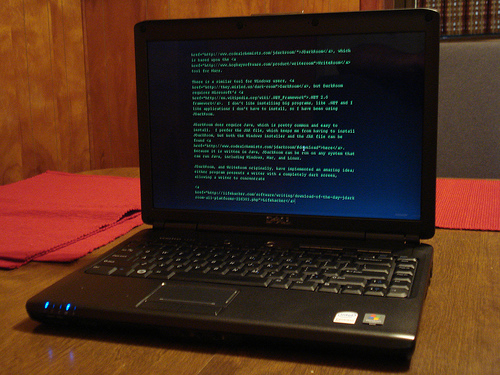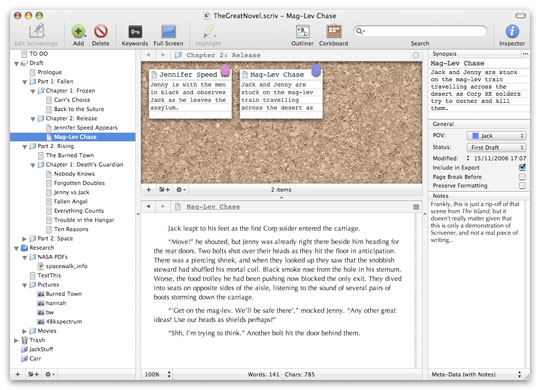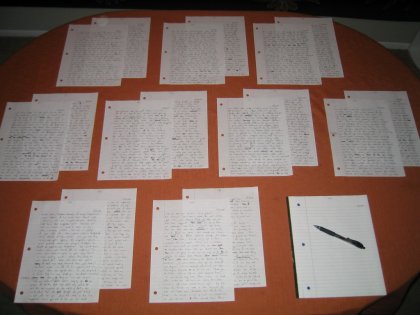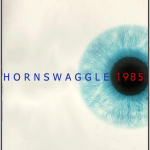How to be a Better Writer
I’m currently unpublished. I imagine a future where I have an actual book in my hand with my name on it, and the thought blows my mind. To me, having a book published is evidence that you’ve truly added something to the world, and I’m determined to get there.
How I’m going about accomplishing that goal, though, is another story entirely.
There are a lot of questions, fears, and even excuses that come up whenever I check my progress towards this accomplishment. The most significant question is also the simplest: What am I doing?
I get mad at myself when I realize that the answer is “Not much.” Actions speak louder than words, so it doesn’t matter how many times I tell myself or other people that “I’m trying to be a writer.” Saying it implies that I’m spending my free time writing, and for a long time this simply hasn’t been true.
I recall a story told by one of my college professors, who is close friends with a professional writer. My professor could call his writer friend on the phone really early in the morning, because he knew that he would be awake. Apparently 5am to 8am was his dedicated “writing time,” and this was a daily ritual. Even if the writing that he produced turned out to be crap that he’d throw away later, it was important to get something out on paper as often as possible. The hardest part about writing, it seemed, was finding the time to write.
I can relate, and I’m certain everyone else that has ever shared in this dream to write knows what I mean. When I mention my interest in writing I often hear people admit “Oh that must be fun. You know, I’ve always wanted to write.” The thing is, there really is no other way to do it! In order to write, you must write one word at a time, one word after another. The only thing separating me from my goal is time — and I’ve wasted a lot of time on other things.
I’ve heard about this “morning routine” strategy from aspiring writers and professional writers alike. Getting up early grants you a few quiet hours to focus on your writing project uninterrupted. Brian Kim describes the benefit of waking up early on his blog:
Because I woke up early, I was able to breathe in the cool crisp morning air, see the sun rise with all its glory, listen to the serene silence of the world sleeping, be alone with my thoughts, and have some extra time to spend.
I’ve had similar mornings, and I know exactly what Brian’s talking about. When you wake up early, you reap the benefits of not having to rush out the door. You can cook a hearty breakfast, put the kettle on, and start your day off a little bit earlier. The extra few hours helps you stay ahead of the game.
But what if you’re not a morning person, and you’re not conscious enough to write coherently if you dared trying to write before mid-afternoon?
The “morning routine” strategy is only one suggestion. In order to be a better writer, you may benefit from having a rigid routine and a dedicated writing time — but remember that there’s no telling exactly when inspiration will strike!
I’ve experienced many nights where I’ve woken up from a vivid dream thinking “Oh man that would make an awesome book.” I’d hit the lamp and scribble a few sentences summarizing plot points, character profile, or dialogue onto a post-it. Now, sometimes when I review what I wrote down later (when I’m actually awake), it might not make any sense. That said, it’s still important to capture ideas as they come to me. Even if these ideas don’t turn into anything bigger than a scribbled post-it, it’s better than letting any potentially great ideas get away.
Which brings me to the important point of organization. Unlike reading a book, where you go from beginning to end, writing a book brings you all over the place. You write bits and pieces of the book over time in multiple sessions, order them into a progressive tale, and revise, revise, revise!
For example, a book’s concept might start with a single sentence: “My brother died five years ago, but that doesn’t stop me from seeing him every time I look in the mirror.”
Now, is this the opening line to the book? Is this a writing prompt? Is this the start of a chapter that introduces a new character? The writer might initially intend use it as the opening line, but later end up adding a prologue. They might change parts of the sentence, or maybe even scrap the sentence entirely.
Writing pieces can transform this way for many reasons. As implied previously, the hardest part about writing is actually writing, and you may not always want to continue writing where you last left off. Maybe you’ll jump ahead in the plot, and write what turns out to be “Chapter 10” before any of the chapters before it are written. Maybe you’re editing your novel in-progress, and you need to add some back-story to the introduction. Since your story is built progressively in a random order, you must find a way to keep track of all of the randomness in order to successfully finish it.
I’m not sure what the best strategy for staying organized is, but I’ll tell you mine. I write down general ideas for blog articles, short stories, and novels on index cards. I keep these cards tacked to a cork-board in my office. This is my “pile of stuff to write, maybe, if it’s any good.”
When it’s time to write I’ll select something from my board, and start to develop that idea into actual writing content. Once the idea starts to take shape, the index card gets trashed to make room for future ideas. I now have a “work in progress.”
The works in progress are stored on my computer. They may be saved as drafts in my blog’s database. They may be saved as Microsoft Word documents. They may be a special file format for specialized writing software. Two different pieces of writing software that I like are jDarkRoom and Scrivener.
jDarkRoom is a simple tool that blacks out everything on your computer except the text that you’re working on. It reminds me of writing on a typewriter, or an old Apple IIe word processor. It’s designed to help you focus on the words, by forcing you to be alone with them. jDarkRoom is free and it is cross-platform (PC or Mac).

Scrivener is a complete writing studio that helps you organize large pieces of writing by arranging it into smaller, manageable snippets of text. It’s like an outline and word processor combined, that’s on steroids. Unlike jDarkRoom, Scrivener is available for Mac only, and after 30 trial uses it must be purchased for about $50.

These two tools are extreme opposites of the writing spectrum. jDarkRoom is as simple as possible: it’s just you and your text (there’s no Spell Check, and you can’t print — it’s explicitly a TEXT EDITOR used to EDIT TEXT). Scrivener starts you out with a multi-chapter tutorial for how to use all of its different features, and how you can customize the interface to fit your novel-writing needs.
They serve different purposes, and therefore I like them both equally. For short articles that can be finished in a single session, jDarkRoom can come in handy to help me focus. For story ideas that will be hundreds of pages long, Scrivener is my go-to application for writing without becoming overwhelmed.
Of course, there are always other options for staying organized — and they don’t necessarily have to involve computer software. I’ve done longhand before, and for some people longhand is all that they need:
Something about the writing process is more satisfying when when writing manually. It feels more intimate, putting actual words on actual paper. When you’re in the thick of it, and become excited about how your story is unfolding, longhand allows you the thrill of racing to keep up with your thoughts. It’s the most exhilarating feeling to love what you’re creating as you’re creating it, and it’s addictive because once you’re in that mode you don’t want to stop.
Other benefits of longhand include:
Price: A set of writing utensils and a notebook will set you back $5.
Permanency: When something is written in pen, it is hard to erase it. Many ideas are shot down too soon because they’re so quick to erase using the “delete” key.
Mobility: I carry a small moleskine notebook in my pocket for writing on the go.
To reinforce what I mentioned earlier, I’m not sure what the best strategy for getting organized is. Different strategies will work better for different people, and you’ll have to find out what works best for you. The tools and methods I’ve mentioned above seem to be working for me, but I’m always willing to make appropriate adjustments in order to achieve better results.
There is only so much you can do on your own, so at some point you may need to collaborate with others in order to achieve the result that you want. This might mean joining a local writing group, sharing your writing with an editor (even if your editor is your significant other), or pursuing an actual degree in journalism, creative writing, or rhetoric.
Lately, I feel like further education may be the next step for me. I’ve gone a certain distance on my own, but I need help in order to advance to the next level. I have a specific program in mind, the Creative Writing program at the University of Iowa — but since it is a prestigious writing program I know that it would be stupid to not have other options as a backup.
I want to be a better writer, but the desire to be one is only the first step. The next step is to write a lot, and the partial manuscript required as part of the university’s application is my target. So let’s do this. Let’s earn the official title of “writer.”
Related Posts
| If you've found this website helpful, please click the PayPal button. You will be helping me pursue my dream career as a writer. Thanks for your support! |















One Response to “How to be a Better Writer”
Interesting article Shaun. Two things that helped me may be of interest to you:
1. I declared myself a writer. That made all the difference in the world. There’s something powerful about that “I am” declaration that works magic.
2. I joined a writer’s group, which provided constructive feedback and gave me an incentive to write something to share for each meeting.
Do you find a writer’s group helpful?
Jerry